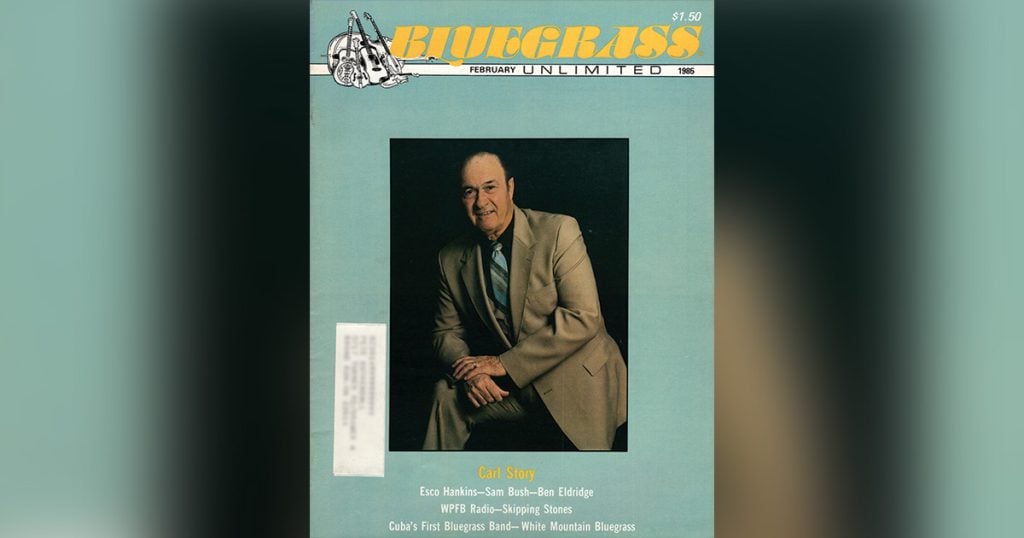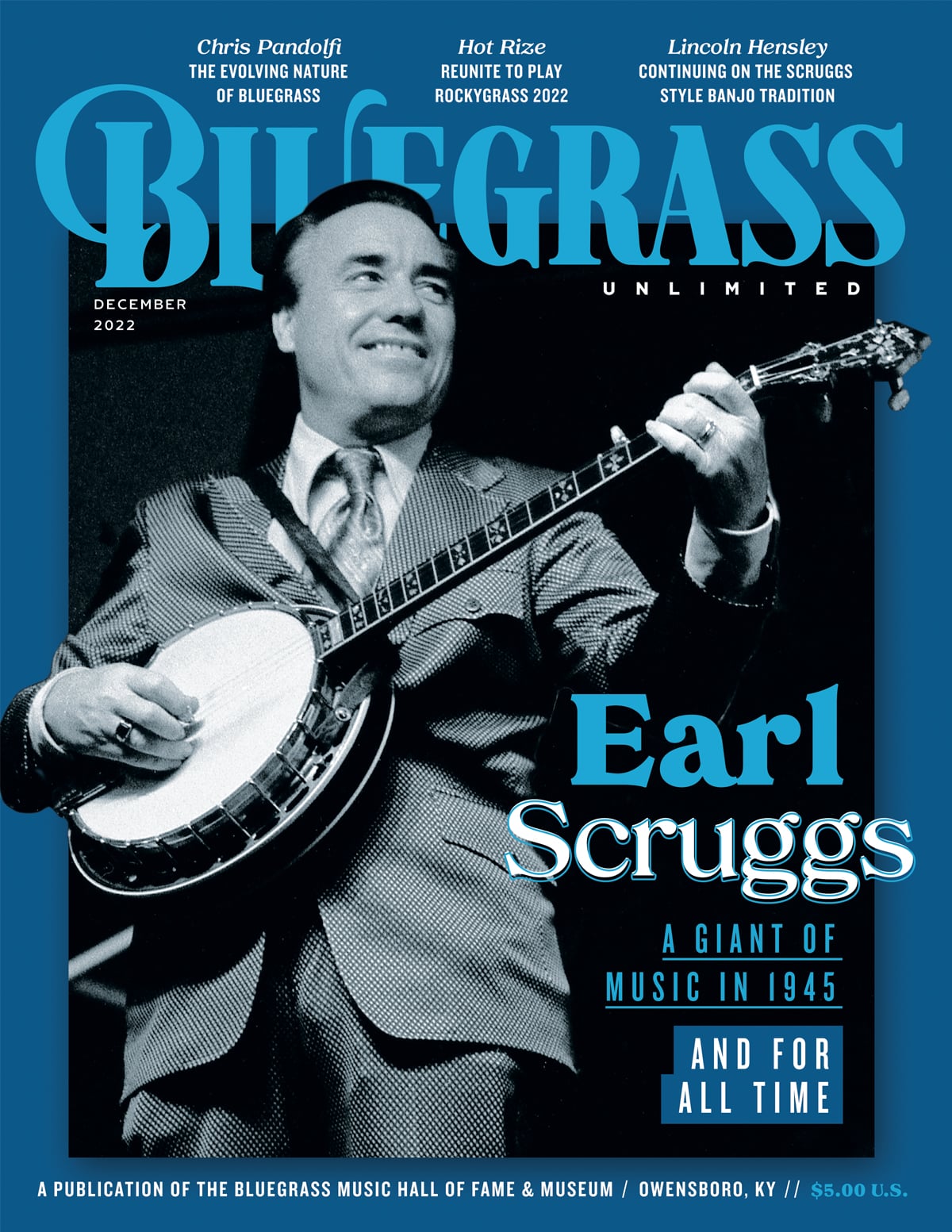Home > Articles > The Archives > Carl Story and the Rambling Mountaineers Golden Anniversary
Carl Story and the Rambling Mountaineers Golden Anniversary
Reprinted from Bluegrass Unlimited Magazine
February 1985, Volume 19, Number 8
October 1984 was another of many milestones in the music career of Carl Story, but this one was very special, as it marked 50 years since he initially formed The Rambling Mountaineers. During these 50 years in hillbilly and bluegrass music, Carl Story has performed, written and recorded varied song material but has primarily remained with the gospel side of music. It was only fitting that in 1974 Carl Story was proclaimed the King of Bluegrass Gospel. There has been no other bluegrass artist to record as many gospel songs as he has.
While visiting with Carl recently at his home in Greer, S.C., we discussed his strong ties with gospel music. He says that his having done so many gospel numbers relates to his belief, a belief he has based his life on and can portray to his audience.
Carl Story was born in Lenoir, N.C. on May 29, 1916. Both his parents played music. Carl’s father was an old-time fiddler, while his mother played guitar and organ.
Young Story’s first instrument was an inexpensive guitar. He sold twelve jars of Cloverene salve, then mailed the company the proceeds along with an extra $2.00. Each day would find Carl waiting anxiously for the mailman. When the day finally came that the guitar arrived, Carl’s mother began to teach him the chords and soon he was on his way.
At the age of only 16, Carl, along with young Johnnie Whisnant started on a musical career playing for J.E. Clark. Carl had a regular job in a local furniture factory but played music on the weekends. The tenure with Clark lasted only two years. Clark payed on a percentage basis and having a large band the money he took in wasn’t much after being split between seven or eight people. So, after a show one night in 1934, and after the gate receipts were divided, Johnnie, who by then had been tagged “Half Pint,” said to Carl, “I believe we can do better to branch out on our own.” They left the show and in a few weeks had their own band which was comprised of Carl on fiddle, Johnnie on banjo along with two other local furniture workers, Ed McMahan and Dud Watson, both on guitar.
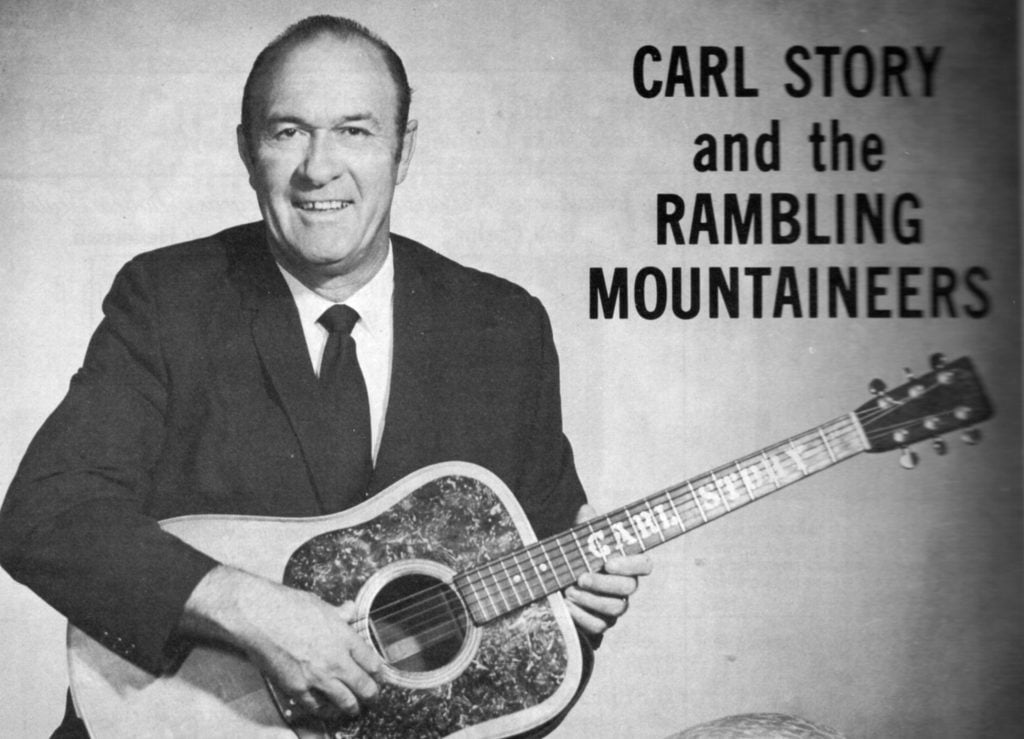
At first the four did not play any shows but began practicing to get their sound right before making a performance on stage. When they felt they were ready, each said, “Well, who will be the leader?” At Carl’s suggestion, they drew straws and the one who drew the short straw would become the leader far the group. Carl drew the short straw and the other three said, “Carl, what are you going to name us?” He said, “If we play to make any money at this we’ll be doing a lot of rambling, and we’re all from the North Carolina mountains; so we will call our band the Rambling Mountaineers” This was all in October 1934.
All four were working in local furniture factories and would only do shows on Saturday nights. They had no radio show or sponsor of any kind, but would rotate each week with one member going out to set up a show and tack posters on trees as there were no light poles at this time. Although they didn’t receive much money they were booked every Saturday night and were beginning to gain exposure in western North Carolina. Many times they would play a schoolhouse with just one lamp sitting by the stage.
The exposure they had obtained from these Saturday night performances led to a job on WHKY radio in Hickory, N.C. They received no money from the station, but were allowed to announce their show dates. It wasn’t but a few weeks before they started receiving bookings by mail at the station. This relieved them of having to go out on the road to work up show dates. They would take all the dates they could handle and announce them on the air. Still, even with being on radio, music was a part-time affair. All four still held regular jobs.
Shortly after the radio program one afternoon they were getting their instruments together when Carl was called to the phone. It was the President of the Taylorsville, North Carolina American Legion requesting him and the Rambling Mountaineers to do a show at the Taylorsville Courthouse. Taylorsville, N.C., had the largest courthouse around; they could seat several hundred. Little did Carl or any of the band realize that this show would be a turning point for the Rambling Mountaineers. They plugged the show on the air along with others for the month before the show. When they arrived at Taylorsville, the whole town was packed, and they made their way to the courthouse. After performing before a packed house with many standing outside, they were asked to do a second show to handle the crowd.
At this same time, Carl was working at a Lenoir furniture factory for 10 cents an hour, as were the rest of the band. Carl says he worked hard from 5:30 p.m. until 7:00 a.m., making 67 and a half hours a week.
After the Taylorsville show, Carl had made more money in one night than he could make in seven weeks at the furniture factory. He told the others, ‘‘Boys, I don’t know about you but I’m going to quit my job and go into music full-time.” With very little discussion, they all agreed to follow.
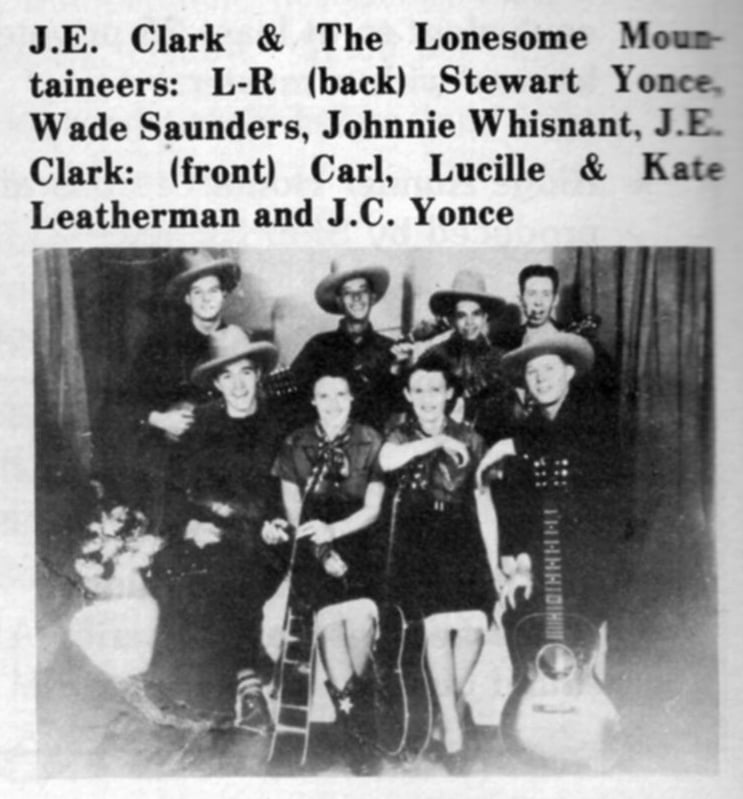
They remained on WHKY for about four years, when one day a booking agent came by. He was Hall Houpe from Valdese, N.C. Houpe booked many of the Grand Ole Opry stars. He asked Carl about booking them and Carl explained that they were just known locally. Houpe said he could change all that “and put them to making money.” He said the deal would be for one hundred dollars a day, with himself getting ten-percent. According to Carl, at that time the group was extremely impressed with the offer since ninety dollars was a “small fortune.”
About a month went by and they hadn’t heard from Houpe. Then one afternoon the promoter came by saying he had them booked for seven days in Washington, D.C. They would be playing a theatre doing five twenty-minute shows a day and would be paid after the last show each day. It all seemed unreal as they had never worked outside the Carolinas or made that kind of money before.
They left for Washington driving a model A Ford. It didn’t have a trunk so they had to pile all their clothes and instruments in the back seat, with “Half- Pint” and the other three crowded in the front seat arriving in Washington at 11 a.m. After they got a room they had only 25 cents left and were starving. Carl knew they would have to work five shows that day with the first starting at 1 o’clock and they would not be paid until that night. Carl told one of the members to take the quarter and go get all the bologna it would buy—they ate bologna and drank water.
After four years on WHKY, the Rambling Mountaineers moved over to WSPA Radio in Spartanburg, S.C. They remained there for a year, then went back to WHKY. A while later they relocated on WWNC in Asheville, N.C.
It was at this time Carl received a call from Art Satherley who was an A&R man for Okeh Records, a subsidiary of Columbia Records. He asked if they had a recording contract with anyone and Carl told him no. The next day he came down and signed them up. Shortly thereafter they went to WSB in Atlanta and cut eight songs. Carl says these recordings were among the first by any group to feature fiddle and three-finger-style banjo together and he feels they were actually the first bluegrass records ever made. The records were never released and the masters were lost. Years later when Carl went with Columbia, Don Law made an extensive search for the recordings but they were never found.
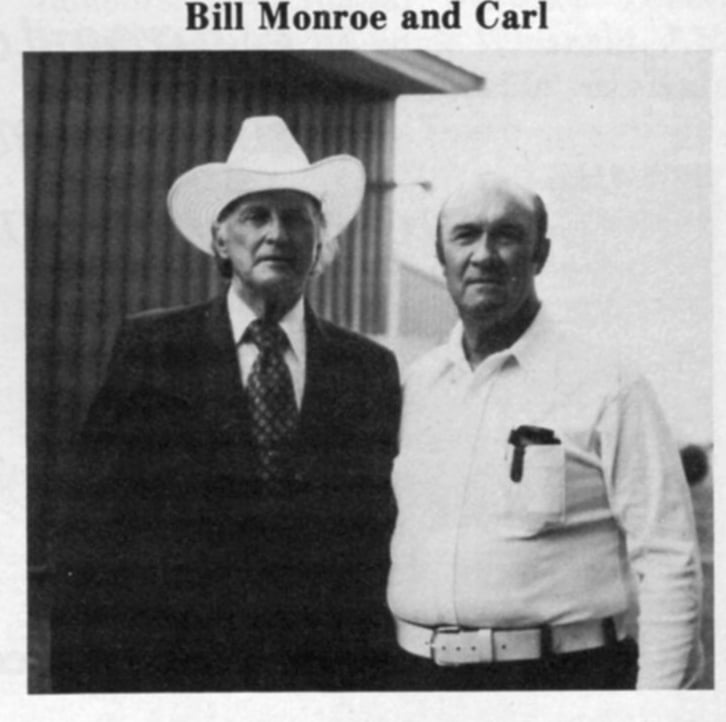
In 1973, bluegrass historians were granted the opportunity to hear what the Rambling Mountaineers sounded like back in the 1930s. When the boys played a show, quite often someone in the community would invite them for a meal. On one of these occasions after finishing supper, the host asked them to do a few numbers, so they could record them on their new disc recorder. The boys obliged and afterwards Carl forgot about the recordings. About thirty years later Carl was playing a show and during the intermission an elderly couple came up and presented him with those acetate discs they had recorded at their home back in 1939. Six of those acetates were released on a small album by Puritan Records in 1973.
In the summer of 1942, Clyde Moody was working for Bill Monroe and had come back home to Marion, N.C. for a short vacation. During this time Carl and Clyde became acquainted and Carl had Clyde do a guest spot on his radio show on WWNC.
By 1942, Carl Story was having an extremely difficult time holding a band together. As fast as he could hire someone, the service would call them. In the latter part of 1942 Carl’s landlady came upstairs at 2 o’clock on a Saturday morning and said he had a phone call downstairs. Fearing something was terribly wrong with his parents, Carl rushed downstairs and picked up the phone. It was Clyde Moody. Carl asked him where he was and Clyde replied that he was there in Asheville, down the street at Tingles Restaurant, and for Carl to come on down. Carl said no, he was in bed. Clyde told Carl to wait, he had someone there that wanted to talk with him. Then this solemn voice said, “This is Bill Monroe. How would you like to be a Blue Grass Boy?” Carl replied saying that sounds fine. Bill said he needed a fiddle player and Carl said he couldn’t do it because he didn’t play the fast pace that was required. But Bill insisted Carl could work his way into it. Carl knew the war was taking his band one by one and he also faced the fact that he could be called at any time. He started talking money with Bill, who asked what he had to have. Carl, already knowing what Bill was paying Clyde, said “I want what Clyde Moody makes.” So Bill asked what does he make? Carl said, “You sign his check.” It looked as though Bill Monroe had met his match at bargaining and said, “Boy, pack your things and get on down here. We’re on the way back to Nashville and are already running late.”
Carl walked back upstairs and awoke the band explaining that due to the war it was becoming increasingly difficult for him to keep a band together so he was going to Nashville with Bill Monroe.
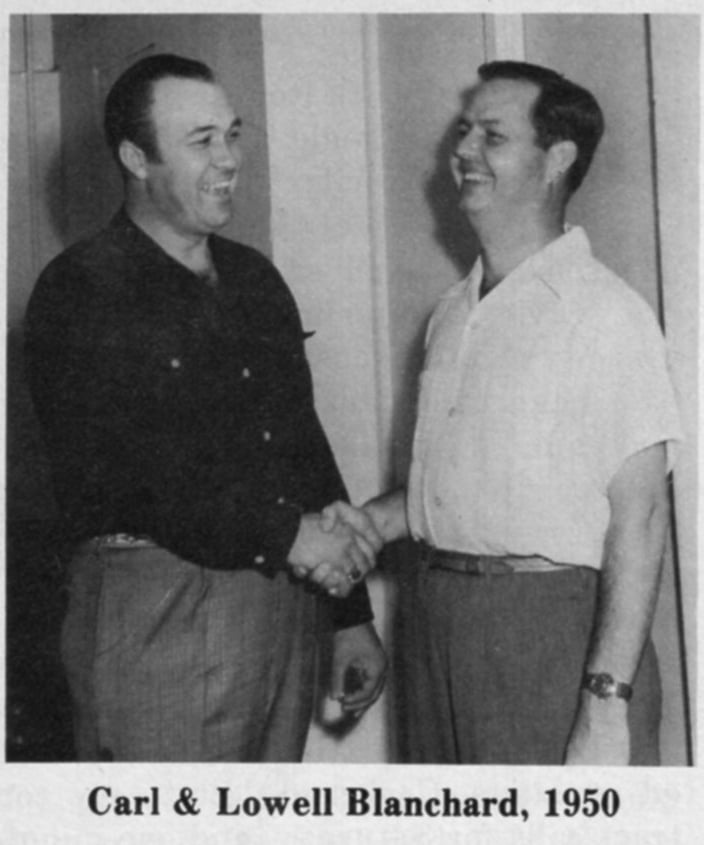
Bill had this vehicle he referred to as a bus, but Carl says it was really just a specially made five-seat Chevrolet, and the roughest riding thing he had ever ridden in. They arrived in Nashville about noon. Bill had called ahead and had a room waiting for Carl at a hotel just up the street from the Ryman Auditorium. Carl couldn’t sleep any during the trip, so consequently had not slept since 2:00 a.m.
Bill Monroe had a regular radio program at 6:30 p.m. performed just before the Grand Ole Opry came on. Bill told Carl to get a little sleep and he would have someone call him in time for the 5 o’clock rehearsal. They would go over the “Orange Blossom Special” then. Carl told Bill he couldn’t play that song with the speed he and Howdy had been doing. Carl was referring to Howard Forrester who was Bill’s fiddler prior to Carl. “Howdy” had been drafted into the service. Bill assured Carl that he could handle it.
It seemed like Carl had just closed his eyes good when Clyde Moody knocked on the door and said it was time to go. They did the radio show and two shows on the Grand Ole Opry that night. Immediately after their second Opry performance they all got back into the stretched-out Chevrolet and left for Valdosta, Georgia for a Sunday afternoon show. Carl says his first two days as a Blue Grass Boy was a rewarding but very tiring experience.
Carl saved every dime of his salary while working as a Blue Grass Boy. Since Carl was a good salesman, Bill put Carl in charge of selling his pictures, prize candy and souvenirs. Carl would receive 10% from these sales besides his weekly salary. Bill paid all the band members’ hotel bills so Carl used that extra income to buy his meals.
The Blue Grass Boys during Carl’s stay consisted of Bill on mandolin, Carl on fiddle, Clyde Moody on guitar, Dave “Stringbean” Akeman on banjo. Cousin Wilbur Wesbrook on bass and Sally Anne Forrester (Howdy’s wife) played accordian. Carl stayed with Bill Monroe for almost a year before being called into the Navy in October, 1943.
Shortly before Carl went with Bill Monroe he had been contacted by Lowell Blanchard who headed up The Mid-Day Merry-Go-Round and the WNOX Barn Dance out of Knoxville, Tennessee. Carl had explained then that Uncle Sam was taking his band probably him too at any time. So Blanchard told Carl to let him know anytime he wanted a job. After being discharged from the service in October of 1945, Carl went back home to Lenoir, N.C.
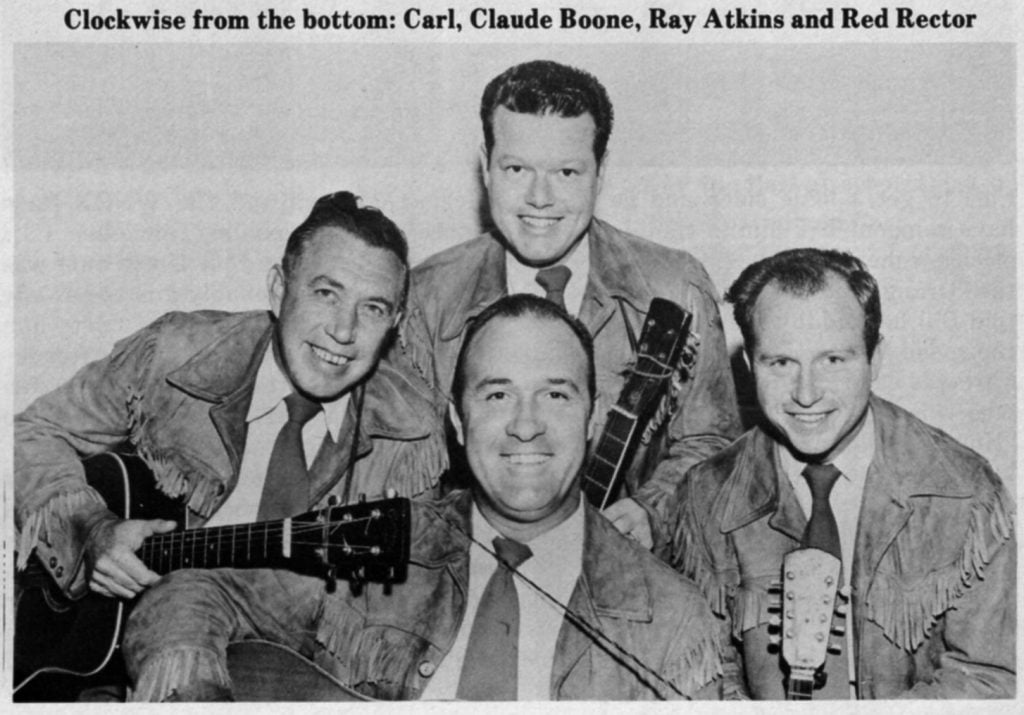
Carl called Lowell Blanchard and said he had the service behind him, and he wanted to form a band and go to work for Lowell. A week later Lowell responded saying, “Carl, get you a band together and come on to Knoxville. I have you on the Merry-Go-Round from 12:15 to 12:30 daily and two shows every Saturday night on The Tennessee Barn Dance.”
Carl hired Hoke Jenkins along with Jack and Curley Shelton. They all left for Knoxville in December of 1945. Lowell Blanchard also took over Carl’s booking. Carl says they had to beg for a night off. Along with the noon and Saturday night radio shows, they were playing on the road six nights a week and on Sunday afternoon. WNOX was the first station Carl had worked for that paid a salary. The band received $60.00 a week and the leader got double that.
After a while Jenkins and the Shelton brothers grew tired of this fast-paced living and informed Carl that they would soon be going back to Asheville. Carl hired a number of other musicians in the subsequent years to keep his band together most notably Red Rector and Claude Boone. Around this period Carl slowly began to switch from fiddle to guitar.
Carl was contacted shortly after his joining WNOX by Dee Kilpatrick of Mercury records. For the first record Mercury wanted hillbilly tunes but Carl persuaded them to use gospel songs. He knew from the great response he was receiving by doing one gospel song on every radio show that gospel records would sell. The first recording session for Mercury was not recorded in a studio but in someone’s home in Knoxville. They set up four microphones in one room and did the recording from an adjoining room.
One day a fellow that worked for Mercury brought Carl a disc and said, “You listen to this. It has the makings of a hit record.” This was before the days of tape and sometimes a songwriter would have someone record his song on a disc and send it to a record company. Carl listened to it and agreed that it had potential. Then he and the band worked up their arrangement. The title was “Tennessee Border.” It was written about a couple in Tennessee that went across the Tennessee border into Georgia to get married because Georgia did not require a blood test as Tennessee did. Carl Story and the Rambling Mountaineers recorded the song and it stayed number 1 for 18 consecutive weeks in 1946.
Carl received another disc by mail at the radio station from a man at Lenoir City, Tennessee, named Hubert Smith. The song was “My Lord Keeps A Record.” Carl liked the song but knowing how Mercury felt about gospel songs, he decided to go at it a different way. Carl sang the song one time on his midday radio show and asked the folks to write in and let him know how they liked it. The response was tremendous. Carl presented the song to Mercury along with the letters and they agreed to record it.
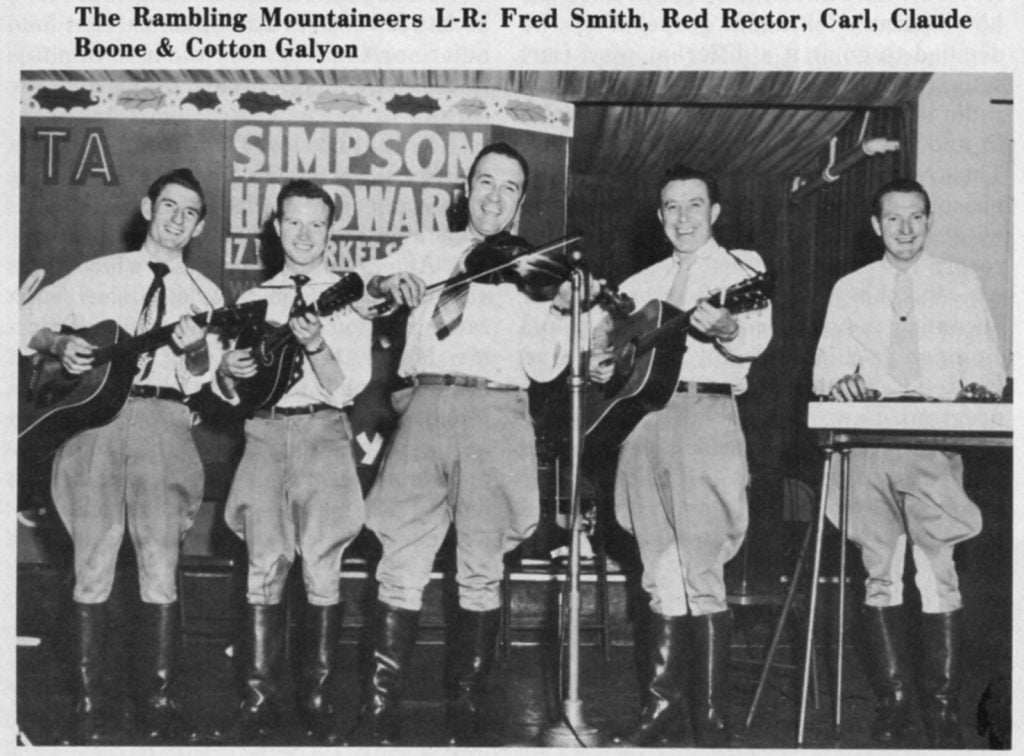
At this time Wally Fowler was becoming famous for his all night gospel singings in Birmingham, Alabama and wanted Carl to come sing the song on his program. Lowell Blanchard had a strict rule that none of his performers miss the Saturday night show. Finally Wally Fowler offered Lowell a contract that he could not refuse for Carl to come and just sing that one song.
Carl, along with Red Rector, Cotton “J” Gaylon and Claude Boone, arrived at the Civic Auditorium in Birmingham shortly before 8:00 p.m. They were ushered to a small room behind stage. The Civic Auditorium had a seating capacity of nine thousand. After a while a backstage attendant came in the room and said, “You folks haven’t been here before.” Carl said, “No sir.” The man said “You know that crowd out there came to see you because all of these quartets have been here a dozen times or more and I’ve never seen a crowd like this. They have them standing in the halls.”
By 11:30 they still had not been called on stage. Carl said, “Boys, my contract calls for Saturday, and one minute after 12:00 will be Sunday. So if they don’t call us by then we’ll leave and Wally Fowler will still have to honor the contract. Wally Fowler knew the contract called for just the one song. He called them on stage at ten minutes to twelve. They walked on stage and never spoke a word but just started singing. Carl says he has never heard an applause that loud before or since. It took them 45 minutes to sing one song, having taken nine encores.
In 1951 Carl went on WAYS radio in Charlotte, N.C. He and the Rambling Mountaineers did three 15 minute spots daily at 8:45 a.m., 12:30 and 4:00 p.m.
At Mineral Springs, which was about 30 miles from Charlotte, they had a cattle auction every Monday. The owner, Mr. Moser, hired Carl and the band to come and play for the cattle buyers one Monday. Carl says when they arrived and went inside he looked the place over and immediately got the idea for a barn dance. After their performance Carl approached Mr. Moser with his idea, an idea that in a few short weeks would prove successful. Carl said, “Mr. Moser, you have here a perfect place for a Saturday night barn dance. You already have this large horseshoe seating for an audience. So all you need to do is make a stage that can be lifted up during the cattle auction and lowered on Saturday night for the barn dance.
Several weeks later Carl received a phone call at the radio station just after his 8:45 a.m. show. It was Mr. Moser who asked Carl if he would tape his noon show and come have lunch with him at Mineral Springs. They discussed the financial arrangements for the proposed barn dance with Carl offering “I’ll advertise it on my radio show and we’ll broadcast it, live every Saturday night. You take all the proceeds from the restaurant and I’ll give you ten percent of the gate.” They named it the Tar Heel Barn Dance and Carl plugged it on his radio programs for several weeks before opening night. When Carl and the Rambling Mountaineers arrived for the first show, they faced a crowd so large that it was hard even for them to get in. Carl continued with The Tar Heel Barn Dance for two years, returning to Knoxville in the mid 1950s.
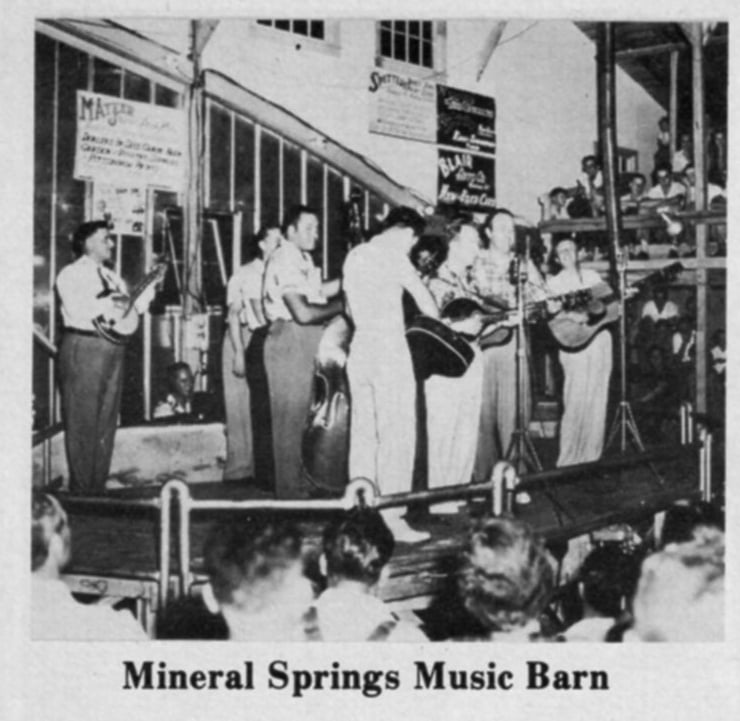
Later it became known as The Mineral Springs Music Barn and has continued until today. Years later the old barn started to disintegrate and a new structure was built just a few feet from the old one. Carl still plays there quite often and recalls a unique experience just a few years ago. The group was performing but people in the audience kept pointing over Carl’s head. While still playing, Carl glanced over his head and there was a snake hanging on a rafter. At the end of the song Carl said “Folks we’re going to continue to sing but if that snake makes a move we’ll be out there with you fast!” They played their entire show and the snake never moved.
Having traveled all over the U.S. for the past fifty years, Carl Story has logged many personal experiences on the road. One he says comes to mind while talking about that snake at Mineral Springs. “We were booked for a Saturday night show in Ohio and scheduled a program at a church away back off the highway. We arrived ahead of schedule and got the PA system set up and had over half an hour before we had to start. We were just sitting around. Claude started walking around. A few minutes later he walked back and said ‘Carl, you see that box sitting over there on that table?’ Claude told me to go look and see what was in it. I walked over and looked in. The box had a huge rattlesnake coiled inside with only a piece of screen wire on top. I went straight over to the preacher who had signed our contract and asked him what that snake was doing there. He told me he was going to handle that serpent later. I told him not while we’re here you won’t. We have a show tomorrow in Ohio and it doesn’t really matter if we work here or not. Then that preacher began quoting the scripture about handling the serpents. I told him to stop misusing scripture on me. That he was tempting God.”
It was then that the preacher told Carl to go on and sing: that he wouldn’t move the serpent as long as Carl was there. Well as soon as they finished singing, Carl didn’t have to tell the band to hurry. They all ran over each other getting their instruments packed and out of there.
Nearly a year later Carl received a phone call from Wendy Bagwell asking if he would help him do a benefit show in Atlanta, Carl said he would. Wendy said, “Fine. And when you get here I have a bone to pick with you.” When Wendy saw Carl he was laughing and said, “You’re the one who caused me to play that snake church in Kentucky.” Wendy went on to explain that they did play there and he said they had more than one snake that night. He said he had never been so scared before or since.
The show that afternoon was being taped. During Wendy’s portion of the show he started talking about this experience using the true facts along with some adlib. The tape was put on a record and made a tremendous hit.
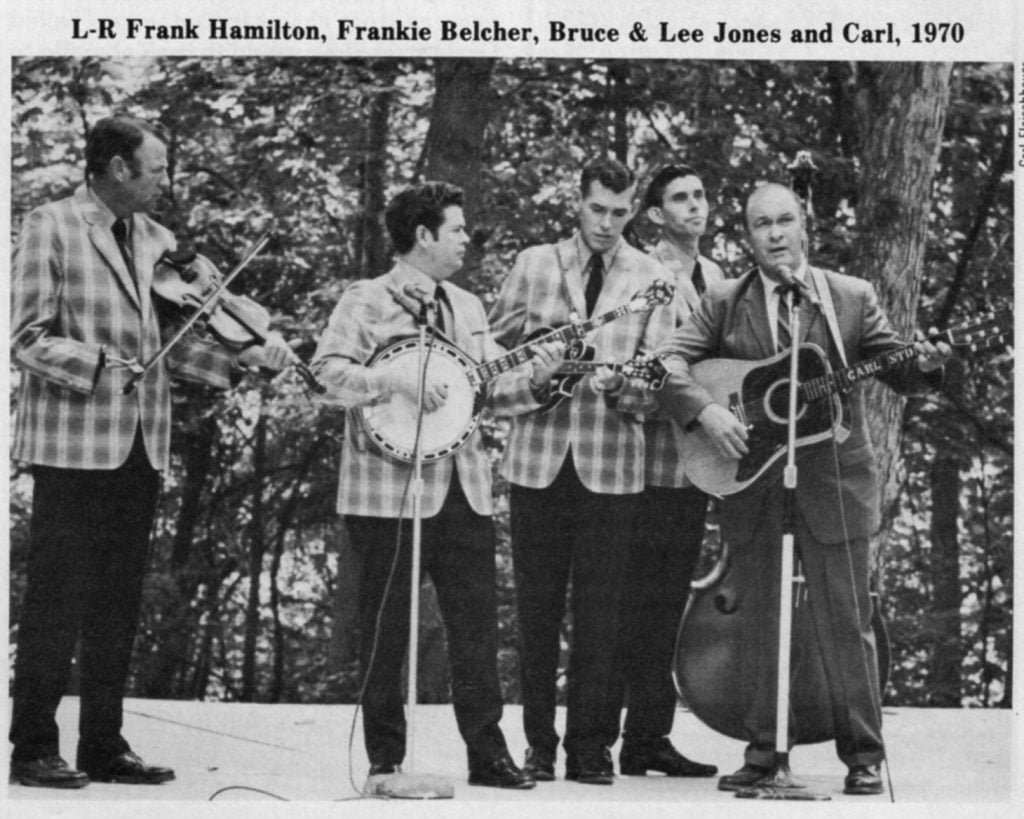
Carl Story left Mercury, during the early 1950s and signed with Columbia records. He says that Columbia did not promote his records as Mercury did. Still there was some very good material recorded during this period such as “Love and Wealth” and “Reunion in Heaven.” He returned to Mercury and later recorded a number of bluegrass classics for Mercury-Starday including “Light at the River” and “Mocking Banjo”
During the later 1950s, Carl signed with Starday where he went on to make musical history. Only a few days after signing with Starday, Carl received a call from Don Pierce saying he wanted them to come to Nashville right away and cut six songs. Pierce told Carl that he would receive only half the usual royalties because the six songs would fill out a package of fifty that Wayne Raney was offering on the radio for only $2.98. Pierce said, “Carl, you’ll get the largest exposure you’ve ever had because Wayne Raney is on the five largest radio stations and covers the whole United States. He will be playing your songs every night.” Carl, along with the Rambling Mountaineers, went to Nashville and recorded the six songs on an EP record. The band members at this time were the Brewster Brothers, Claude Boone and Tater Tate. In three months the record package had sold four hundred and seventy-five thousand.
Carl Story remained with Starday for 18 years and recorded a total of 62 albums with.them. Many of these albums would be leased out to other labels such as Cannon and Faith Records but were recorded by Starday. Counting the three albums by Mercury, Carl has recorded 65 albums.
In 1957, Carl Story moved once again to Asheville, where he had a successful television show for eighteen months. Then in 1958 Cas Walker, who owned one of the largest independent grocery store chains in Tennessee, called Carl to ask if he would fly to Knoxville to talk with him if he sent him a round-trip ticket.
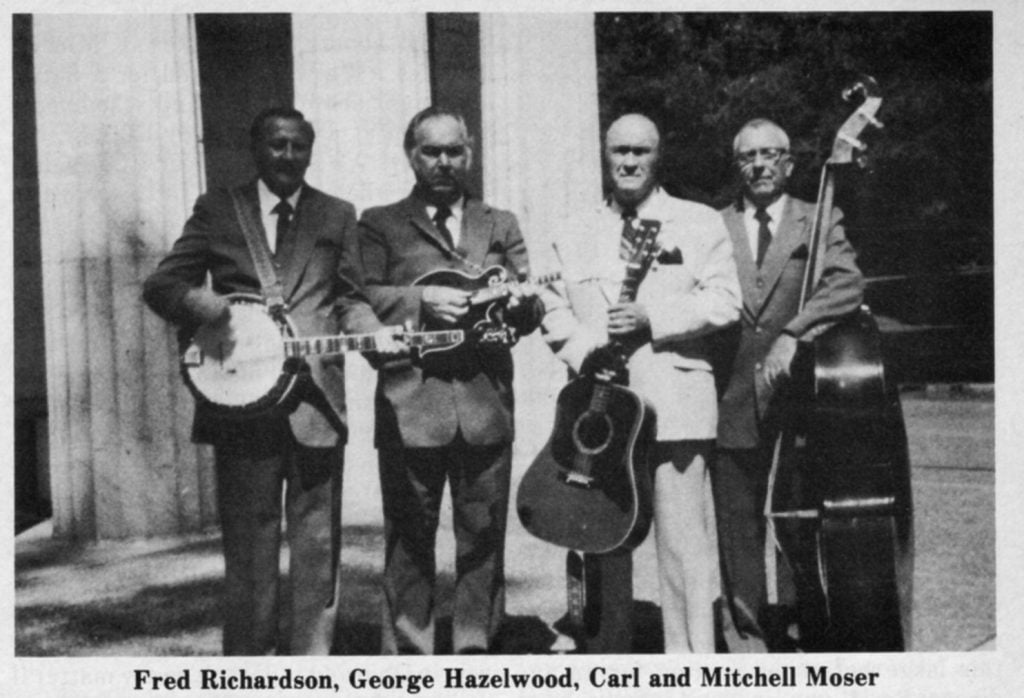
When they met at an airport restaurant the next day, Mr. Walker said, “Son, I want to hire my competition.” At that time Carl was not in competition with any business in Knoxville, but Mr. Walker was referring to back when Carl was on the Mid-Day Merry-Go-Round over WNOX. At that same time Mr. Walker sponsored a program over WKXV. He said, “Boy, when you would come on at noon I didn’t hardly have any listeners, they would all turn to WNOX. So I want you to move back to Knoxville and be on my Wednesday night television show.” They made some small talk and then Mr. Walker asked Carl when he could come to work. Carl replied, “We haven’t gotten to the main part yet.” He pulled a napkin from a holder on the table and wrote a figure on it, then handed it to Mr. Walker saying, “This is what I’ll have to get every week for me and my boys.” Mr. Walker said he couldn’t pay that much. Carl got up and said, “Mr. Walker, it sure was nice talking with you, but I better get on out to my plane.” It was then that Mr. Walker stopped him and said, “I’ll take you up on that if you will promise me one thing. That you won’t ever cash one of your paychecks at any of my stores.” Carl promised that he wouldn’t and the Rambling Mountaineers were on the Cas Walker TV Show for over a year.
When the festivals first started they gave new life to what was then a dying form of American music. Carl Story was on hand to help make these festivals the success they are today. Last year he did performances from Florida all the way to Canada. In the past 50 years Carl has taken his music nearly everywhere in the United States and abroad to West Germany and Holland.
The current group of Rambling Mountaineers with exception of one have been with Carl Story for almost 15 years. They are Fred Richardson on banjo; George Hazelwood on mandolin; Mitchell Moser on bass and Jerry Monde on fiddle.
For some time Carl had been planning to retire during 1984, but as the time grew closer he began to realize that music was his life. A life he could not give up as long as God continued to bless him with good health. Carl says he loves to perform for as well as meet and talk with the people that come out of his shows and that is why he gave up the idea of retiring. Bill Monroe talked with Carl and said, “I’m three years older than you I don’t plan to ever retire.” Bill said, “Carl, I want you to stay with me.” Carl replied saying, “I guess we’ll both be on stage until they have to carry us off.”
